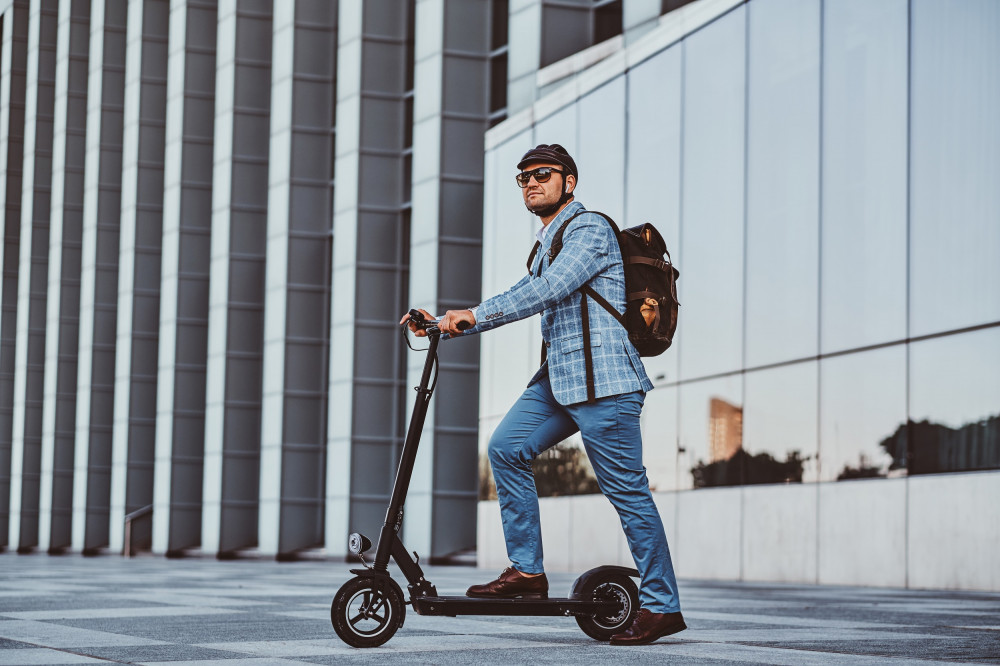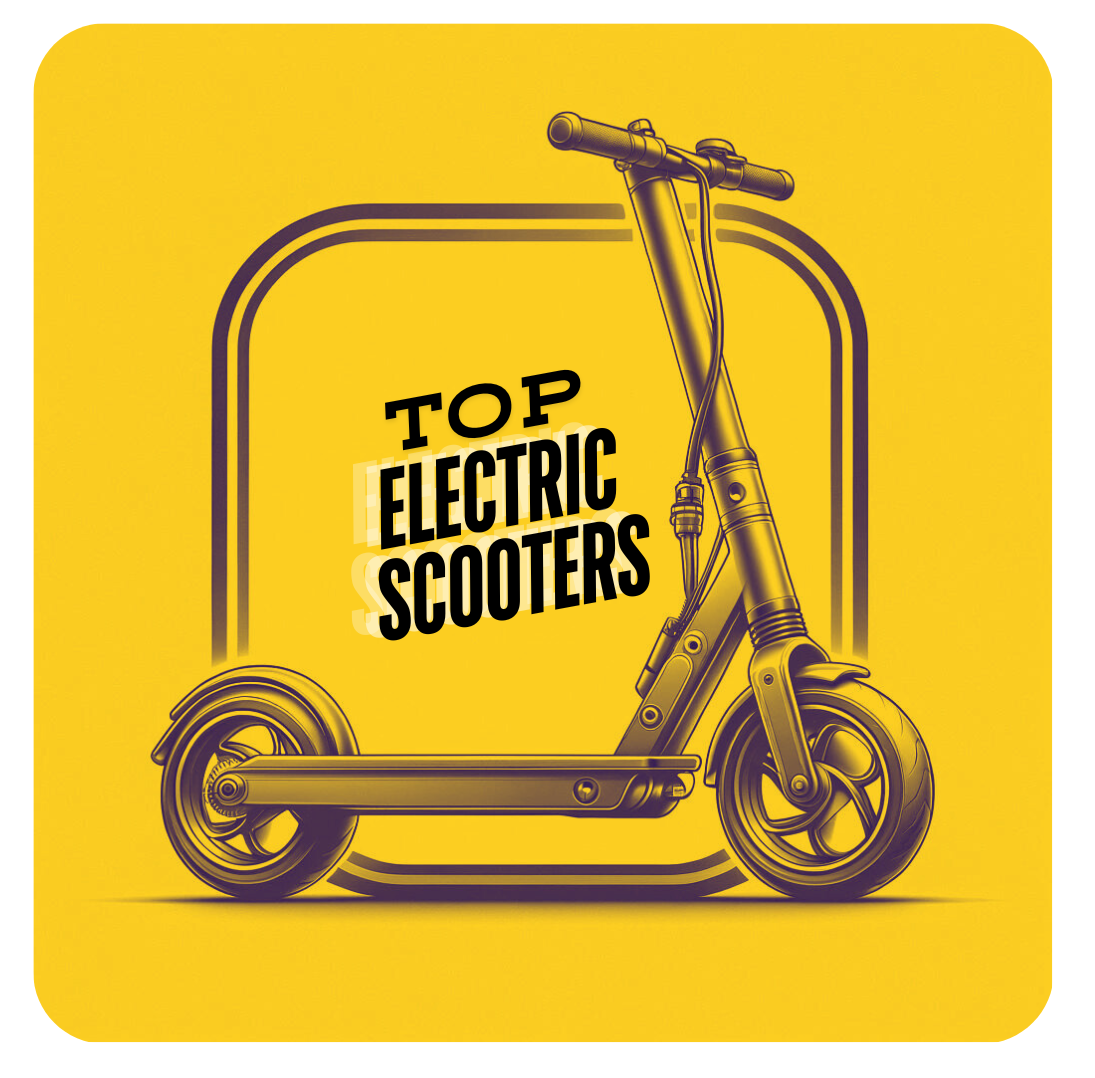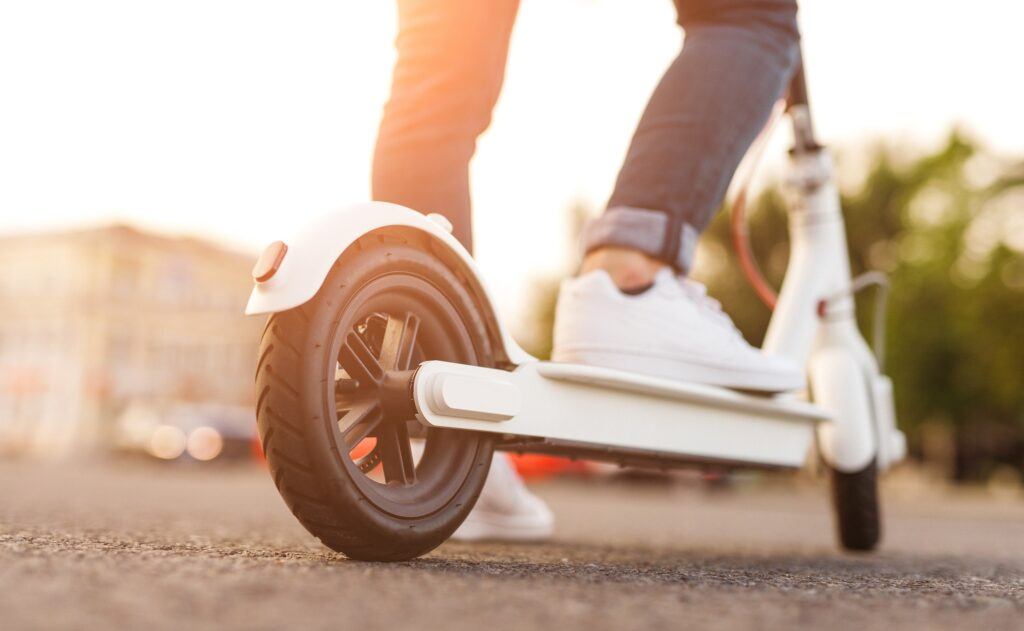
My colleagues often ask me questions about commuting on an electric scooter. A lot of them are considering to purchase one and start using it daily for their commute, but they are usually unsure about a few things and how it would work, so I thought I’d write this post about 9 things you should consider before buying.
1. What kind of roads/pavements are available on your commute?
Okay, so one of the things you should really consider before buying an electric scooter is the kind of roads or pavements that are actually available for you to use on your daily commute. Consider the following:
 Are there any cycle lanes that you could easily use every day? Cycle lanes tend to be a lot safer for use especially if they are separated from the main road. If you live in a large city where car drivers tend to be inpatient and for the most part frustrated, it really puts my mind at rest knowing that on my daily commute I can rely on cycle lanes and not have to worry about getting hit by an irresponsible driver.
Are there any cycle lanes that you could easily use every day? Cycle lanes tend to be a lot safer for use especially if they are separated from the main road. If you live in a large city where car drivers tend to be inpatient and for the most part frustrated, it really puts my mind at rest knowing that on my daily commute I can rely on cycle lanes and not have to worry about getting hit by an irresponsible driver.
Are there any wide pavements/sidewalks you could use?
Again, it is safer to use a nice wide  pavement than be in the road with a lot of cars and buses. You should take into consideration how busy the pavements get with pedestrians and would it be fairly easy for you to navigate past them on your way to work. To give you an example, there is a portion on my daily commute where I would use this pavement that was so busy with pedestrians every day during rush hour, so instead of zigzagging between a sea of people (one thing I learnt is that people do not walk in a straight line and they mainly have headphones on, so cannot even hear me approach from behind), having to be extra careful and slowing down, I decided it was better for me to use the main road for that particular stretch of my journey – it works a lot better for me and it’s safer in that instance.
pavement than be in the road with a lot of cars and buses. You should take into consideration how busy the pavements get with pedestrians and would it be fairly easy for you to navigate past them on your way to work. To give you an example, there is a portion on my daily commute where I would use this pavement that was so busy with pedestrians every day during rush hour, so instead of zigzagging between a sea of people (one thing I learnt is that people do not walk in a straight line and they mainly have headphones on, so cannot even hear me approach from behind), having to be extra careful and slowing down, I decided it was better for me to use the main road for that particular stretch of my journey – it works a lot better for me and it’s safer in that instance.
 How would you describe the roads you would rely on for your commute? Are they really busy roads with a lot of traffic at all times of the day? What is the speed limit? Do cars tend to speed down those roads or are they usually careful and within the legal speed limit? These are all very important things you should think about, as you want to make sure you feel and are as safe as possible on your commute. The roads I use are mainly residential, with a speed limit of 20-30 mph, and I feel a lot safer than I would if I had to rely on using roads with higher speed limits.
How would you describe the roads you would rely on for your commute? Are they really busy roads with a lot of traffic at all times of the day? What is the speed limit? Do cars tend to speed down those roads or are they usually careful and within the legal speed limit? These are all very important things you should think about, as you want to make sure you feel and are as safe as possible on your commute. The roads I use are mainly residential, with a speed limit of 20-30 mph, and I feel a lot safer than I would if I had to rely on using roads with higher speed limits.
2. What is the quality of the roads you’d be using?
This again is a very important aspect you should consider, especially if you already know the make and model of the scooter you’re looking to purchase. Say for example you settled on buying an electric scooter with solid honeycomb tyres, but a lot of the roads on your commute have potholes and are quite old and bumpy. At that point you could either reconsider your route or look into maybe getting a different scooter model that has a better suspension or air-filled tyres instead, which would make your daily commute a lot more comfortable if the quality of the roads you have to use is not up to scratch. This is paramount, and you really want to make sure that your daily commute is nothing short of extra comfortable, as nobody wants to dread a bumpy and unpleasant ride to work every morning.
model of the scooter you’re looking to purchase. Say for example you settled on buying an electric scooter with solid honeycomb tyres, but a lot of the roads on your commute have potholes and are quite old and bumpy. At that point you could either reconsider your route or look into maybe getting a different scooter model that has a better suspension or air-filled tyres instead, which would make your daily commute a lot more comfortable if the quality of the roads you have to use is not up to scratch. This is paramount, and you really want to make sure that your daily commute is nothing short of extra comfortable, as nobody wants to dread a bumpy and unpleasant ride to work every morning.
3. How long is your commute to work?
 This one is also quite significant as you need to make sure that the model you purchase has a long enough range to get you to work. Say for example you buy a last mile commute scooter with a 12-mile range, but the actual route you take to reach your office is 15 miles long. You’re going to struggle to get there efficiently, even if you can squeeze a bit more juice out of your scooter’s battery. The emptier the battery the more electric scooters tend to struggle to perform. They will naturally slow down and not have as much power in them as the battery needs charging. Not to mention if you have any hills on your commute, you’d probably have to start pushing it up the hill like a regular kick-scooter. So check roughly how long your commute is, before actually deciding which make and model to go for, as this will make a massive difference to your electric scooter’s overall performance.
This one is also quite significant as you need to make sure that the model you purchase has a long enough range to get you to work. Say for example you buy a last mile commute scooter with a 12-mile range, but the actual route you take to reach your office is 15 miles long. You’re going to struggle to get there efficiently, even if you can squeeze a bit more juice out of your scooter’s battery. The emptier the battery the more electric scooters tend to struggle to perform. They will naturally slow down and not have as much power in them as the battery needs charging. Not to mention if you have any hills on your commute, you’d probably have to start pushing it up the hill like a regular kick-scooter. So check roughly how long your commute is, before actually deciding which make and model to go for, as this will make a massive difference to your electric scooter’s overall performance.
4. Secure storage for your electric scooter at work
This one might not look like something that should be on top of your list when considering whether to  buy an electric scooter, however I found myself thinking before I purchased mine, where in my office can I actually securely keep my scooter on a daily basis. I work in an office that has a lot of people coming in and out, and I leave the office a lot throughout the course of the day, so I keep mine under my desk, where it’s not even visible to anybody. It’s probably more challenging finding somewhere secure to leave your scooter if you work in a warehouse or in a retail shop, so it’s really worth thinking about this before you decide to buy an electric scooter.
buy an electric scooter, however I found myself thinking before I purchased mine, where in my office can I actually securely keep my scooter on a daily basis. I work in an office that has a lot of people coming in and out, and I leave the office a lot throughout the course of the day, so I keep mine under my desk, where it’s not even visible to anybody. It’s probably more challenging finding somewhere secure to leave your scooter if you work in a warehouse or in a retail shop, so it’s really worth thinking about this before you decide to buy an electric scooter.
5. Are you prepared for inclement weather?
 If you’re going to be using your electric scooter every day, you have to be well-prepared for inclement weather, as most scooters have an advisory not to be used in heavy rain. I live in London, and despite the general conception that it always rains, London actually averages approximately 106 rainy days each year, which is not that bad. I hardly ever get caught in heavy rain on my way to or from work. I purchased some accessories for my scooter which protect it from water getting to where the battery is, the charging port, as well as the motherboard. I also have a waterproof jacket at the bottom of my waterproof rucksack, so I’m always prepared in case I get caught in bad weather conditions. Of course if you live somewhere like LA, this would be the least of your worries.
If you’re going to be using your electric scooter every day, you have to be well-prepared for inclement weather, as most scooters have an advisory not to be used in heavy rain. I live in London, and despite the general conception that it always rains, London actually averages approximately 106 rainy days each year, which is not that bad. I hardly ever get caught in heavy rain on my way to or from work. I purchased some accessories for my scooter which protect it from water getting to where the battery is, the charging port, as well as the motherboard. I also have a waterproof jacket at the bottom of my waterproof rucksack, so I’m always prepared in case I get caught in bad weather conditions. Of course if you live somewhere like LA, this would be the least of your worries.
6. Range and battery charging time
It’s crucial for you to know the range of the electric scooter you are interested in buying, and how long the battery takes to charge. You might have to consider taking the charger to work in order to top up your scooter for your journey home if the scooter range is not enough to cover both your rides. I don’t even use up half of the charge on my electric scooter during my daily commute – and that’s including the ride back home, so my Xiaomi M365 always has enough power for hills, and it goes full speed without a struggle, which is quite essential for a smooth, worry-free ride.
the battery takes to charge. You might have to consider taking the charger to work in order to top up your scooter for your journey home if the scooter range is not enough to cover both your rides. I don’t even use up half of the charge on my electric scooter during my daily commute – and that’s including the ride back home, so my Xiaomi M365 always has enough power for hills, and it goes full speed without a struggle, which is quite essential for a smooth, worry-free ride.
7. Is public transport in the picture?
 Would you have to jump on the bus/train/underground in order to complete part of your journey to or from work because the mileage is too long? This is relevant because it could be in the middle of the rush hour and quite challenging to carry your scooter on busy public transport. It’s also worth thinking about the weight of the electric scooter you are looking to buy and how easy/challenging it might be to handle around a lot of people for extended periods of time.
Would you have to jump on the bus/train/underground in order to complete part of your journey to or from work because the mileage is too long? This is relevant because it could be in the middle of the rush hour and quite challenging to carry your scooter on busy public transport. It’s also worth thinking about the weight of the electric scooter you are looking to buy and how easy/challenging it might be to handle around a lot of people for extended periods of time.
8. Do you have to use your electric scooter at night?
When you decide to use your electric scooter for your daily commute to work, you will probably have to  use it at nighttime, at least during the winter months when it gets dark at 4.30pm. I tend to work odd shift patterns so I often ride my scooter at 9pm and find it necessary to have protective equipment for those nighttime rides. While most scooters have headlights and a tail-light, I suggest getting a hi-vis jacket in order to maximise your visibility to other road users. It really makes a difference to the way you experience your ride if you are fully visible and are comfortable on the road at night.
use it at nighttime, at least during the winter months when it gets dark at 4.30pm. I tend to work odd shift patterns so I often ride my scooter at 9pm and find it necessary to have protective equipment for those nighttime rides. While most scooters have headlights and a tail-light, I suggest getting a hi-vis jacket in order to maximise your visibility to other road users. It really makes a difference to the way you experience your ride if you are fully visible and are comfortable on the road at night.
9. Can you ride your electric scooter legally?
 It is important to know if you can use your electric scooter legally where you reside. I live in London, where it is illegal to use e-scooters. Therefore, I am breaking the law every time I commute to work. However, I decided that it is worth for me to take this calculated risk, as there have been some positive news recently around legalising them. I feel that I am contributing towards a cleaner environment, and doing a lot of good every time I decide to get on my electric scooter instead of using my car. There are a lot of places in Europe and the USA where it is legal to use electric scooters, but I recommend finding out where you stand, and if it is illegal are you willing to risk a potential fine? I have been using my electric scooter for a year and a half now, and in that time I have ridden past police officers quite a few times, and they hardly even glanced at me. However, that is not to say that they won’t stop someone else and hand out a fine for unlawful riding, so this really has to be something you think long and hard about.
It is important to know if you can use your electric scooter legally where you reside. I live in London, where it is illegal to use e-scooters. Therefore, I am breaking the law every time I commute to work. However, I decided that it is worth for me to take this calculated risk, as there have been some positive news recently around legalising them. I feel that I am contributing towards a cleaner environment, and doing a lot of good every time I decide to get on my electric scooter instead of using my car. There are a lot of places in Europe and the USA where it is legal to use electric scooters, but I recommend finding out where you stand, and if it is illegal are you willing to risk a potential fine? I have been using my electric scooter for a year and a half now, and in that time I have ridden past police officers quite a few times, and they hardly even glanced at me. However, that is not to say that they won’t stop someone else and hand out a fine for unlawful riding, so this really has to be something you think long and hard about.
Your decision
When taking all the above into consideration, you might find that you can’t have a perfect solution for every single one of those questions – don’t let it discourage you. You do not need to have an answer to absolutely everything before you buy an electric scooter, sometimes you just need to go with the flow and take a chance. I considered these 9 things before finally making a decision to buy my first electric scooter. Personally, this really helped me feel at ease once I got on my Xiaomi M365 and embarked on my very first commute to work.
I hope this post can help you with your final decision, and please feel free to leave any comments or feedback below.

